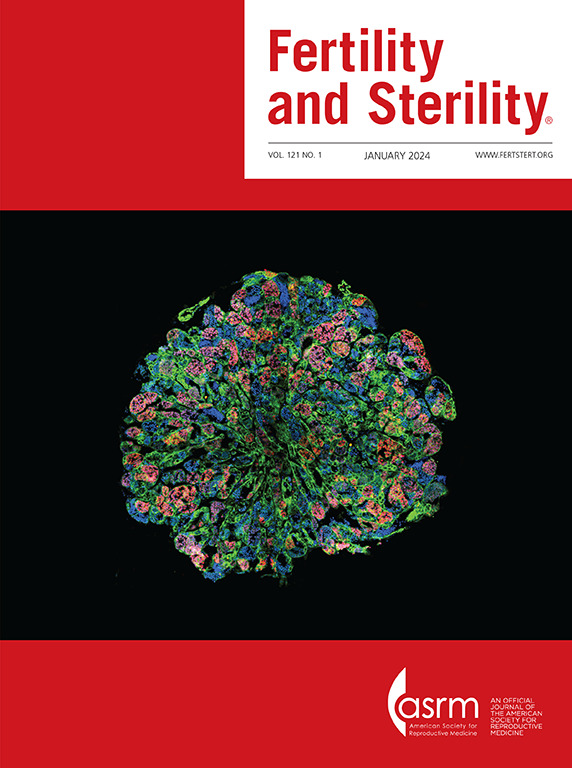Gut Feelings - The gut microbiome as a regulator of mental health in polycystic ovary syndrome.
IF 7
1区 医学
Q1 OBSTETRICS & GYNECOLOGY
引用次数: 0
Abstract
IMPORTANCE Polycystic ovary syndrome (PCOS) is a common endocrine disorder associated with reproductive, metabolic, and mental health comorbidities. The exact mechanisms of PCOS-related psychological distress and the role of the microbiome in the process remain unclear. OBJECTIVE To systematically review the current literature on the gut microbiome's association with mental health in women with PCOS and to review the possible mechanisms. EVIDENCE REVIEW A comprehensive literature search across the PubMed database until July 2025. Studies were included if they met the following criteria: 1) observational / intervention studies, 2) assessing microbiome through 16S rRNA amplicon / 16S rRNA gene sequencing / metagenomics, 3) comparing microbiome between women with and without PCOS, 4) published from 2007 until 2025, and 5) articles available online. The exclusion criteria were: 1) language other than English or Spanish, 2) reviews, 3) abstracts/posters, 4) case reports, 5) full text not available, and 6) duplicates. Two independent reviewers screened all titles and abstracts to determine eligibility, and discrepancies were resolved through discussion. The methodological quality and the potential risk of bias were assessed following the Joanna Briggs Institute Critical Appraisal Checklist for Case-Control Studies. FINDINGS A total of 159 studies were identified and screened for title, abstract, and full text. Eight studies met the criteria (2 rodent; 6 human studies). The quality assessment indicated that half of the studies (4/8) presented a high risk of bias. Regardless of the limited number of studies and the low quality scores, all the studies highlighted the association of the gut microbiome in PCOS with mental health problems. CONCLUSIONS AND RELEVANCE Our review provides the first summary of the studies performed today on the Gut-Brain axis in PCOS. Our review highlights that the current state of the research is rather preliminary, and the existing studies possess various limitations and often lack rigorous study design. Nevertheless, all the studies indicated an association between changes in gut microbiome and mental health indicators in PCOS. We also noted a consistent increase in Gram-negative bacteria in women with PCOS and mental health issues. More research is needed on humans with a bigger sample size, different ethnicities, and wider age groups to clarify the microbial patterns involved, and in parallel, the field should move from descriptive studies to mechanistic approaches. Polycystic ovary syndrome (PCOS) is a common endocrine disorder associated with reproductive, metabolic, and mental health comorbidities. The exact mechanisms of PCOS-related psychological distress and the role of the microbiome in the process remain unclear. In this review, we systematically screen the current literature on the gut microbiome's association with mental health in women with PCOS and describe possible mechanisms. We did a comprehensive literature search across the PubMed database until July 2025. A total of 159 studies were identified and screened for title, abstract, and full text. Eight studies met the inclusion criteria (2 rodent; 6 human studies). The quality assessment showed that half of the studies presented a high risk of bias. Regardless of the limited number of studies and the low quality scores, all the studies indicated an association between the gut microbiome, PCOS, and mental health problems. The studies also consistently reported an increase in Gram-negative bacteria in women with PCOS and mental health issues. The review also describes the possible contributors in gut-brain-PCOS crosstalk, such as gut permeability, inflammation, short-chain fatty acids, neurotransmitters, gastrointestinal hormones, bile acids, and the sex hormone-gut microbiota axis. Our review highlights that the current state of the research on the Gut-Brain-PCOS axis is rather preliminary, and the existing studies possess various limitations and often lack rigorous study design. Therefore, more research is needed on humans with a bigger sample size, different ethnicities, and wider age groups to clarify the microbial patterns involved, and in parallel, the field should move from descriptive studies to mechanistic approaches.肠道感觉-肠道微生物组作为多囊卵巢综合征心理健康的调节因子。
多囊卵巢综合征(PCOS)是一种常见的内分泌疾病,与生殖、代谢和精神健康合并症有关。pcos相关心理困扰的确切机制以及微生物组在这一过程中的作用尚不清楚。目的系统回顾目前关于肠道微生物群与PCOS女性心理健康相关的文献,并探讨其可能的机制。EVIDENCE review2025年7月之前在PubMed数据库中进行的综合文献检索。符合以下标准的研究被纳入:1)观察/干预研究,2)通过16S rRNA扩增子/ 16S rRNA基因测序/宏基因组学评估微生物组,3)比较PCOS女性和非PCOS女性的微生物组,4)发表于2007年至2025年,5)在线可获得的文章。排除标准为:1)英语或西班牙语以外的语言,2)综述,3)摘要/海报,4)病例报告,5)无法获得全文,6)重复。两名独立审稿人对所有标题和摘要进行筛选以确定是否合格,并通过讨论解决差异。采用乔安娜布里格斯研究所病例对照研究关键评估清单对方法学质量和潜在偏倚风险进行评估。研究结果共纳入159项研究,并对其标题、摘要和全文进行了筛选。8项研究符合标准(2项啮齿动物研究;6项人类研究)。质量评估显示,一半的研究(4/8)存在高偏倚风险。尽管研究数量有限且评分质量较低,但所有研究都强调了PCOS患者肠道微生物群与心理健康问题的关联。结论和相关性我们的综述首次总结了目前在多囊卵巢综合征的肠-脑轴上进行的研究。我们的综述强调,目前的研究处于相当初级的状态,现有的研究存在各种局限性,往往缺乏严谨的研究设计。然而,所有的研究都表明,肠道微生物组的变化与多囊卵巢综合征的心理健康指标之间存在关联。我们还注意到,患有多囊卵巢综合征和精神健康问题的妇女中革兰氏阴性细菌的持续增加。需要对更大样本量、不同种族和更广泛年龄组的人进行更多的研究,以阐明所涉及的微生物模式,同时,该领域应该从描述性研究转向机械方法。多囊卵巢综合征(PCOS)是一种常见的内分泌疾病,与生殖、代谢和精神健康合并症有关。pcos相关心理困扰的确切机制以及微生物组在这一过程中的作用尚不清楚。在这篇综述中,我们系统地筛选了目前关于肠道微生物群与PCOS女性心理健康相关的文献,并描述了可能的机制。我们对PubMed数据库进行了全面的文献检索,直到2025年7月。共有159项研究被确定并筛选了标题、摘要和全文。8项研究符合纳入标准(2项啮齿动物研究;6项人类研究)。质量评估显示,一半的研究存在高偏倚风险。尽管研究数量有限且得分较低,但所有研究都表明肠道微生物群、多囊卵巢综合征和心理健康问题之间存在关联。这些研究还一致报告了患有多囊卵巢综合征和精神健康问题的女性中革兰氏阴性细菌的增加。综述还描述了肠-脑-多囊卵巢综合征串扰的可能因素,如肠道通透性、炎症、短链脂肪酸、神经递质、胃肠激素、胆汁酸和性激素-肠道微生物群轴。我们的综述强调,目前对肠-脑-多囊卵巢综合征轴的研究处于初级阶段,现有研究存在各种局限性,往往缺乏严谨的研究设计。因此,需要对更大样本量、不同种族和更广泛年龄组的人进行更多的研究,以阐明所涉及的微生物模式,同时,该领域应该从描述性研究转向机械方法。
本文章由计算机程序翻译,如有差异,请以英文原文为准。
求助全文
约1分钟内获得全文
求助全文
来源期刊

Fertility and sterility
医学-妇产科学
CiteScore
11.30
自引率
6.00%
发文量
1446
审稿时长
31 days
期刊介绍:
Fertility and Sterility® is an international journal for obstetricians, gynecologists, reproductive endocrinologists, urologists, basic scientists and others who treat and investigate problems of infertility and human reproductive disorders. The journal publishes juried original scientific articles in clinical and laboratory research relevant to reproductive endocrinology, urology, andrology, physiology, immunology, genetics, contraception, and menopause. Fertility and Sterility® encourages and supports meaningful basic and clinical research, and facilitates and promotes excellence in professional education, in the field of reproductive medicine.
 求助内容:
求助内容: 应助结果提醒方式:
应助结果提醒方式:


